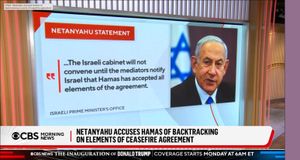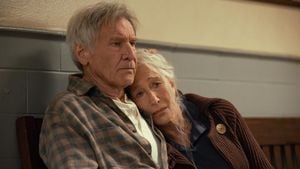After five years battling prostate cancer, renowned journalist Máximo Pradera, 66, has made his long-awaited television reappearance to share his transformative health insights and life lessons. Appearing on Telecinco's 'Fiesta' on February 22, 2025, Pradera discussed his approach to nutrition as the cornerstone of his recovery, which he elaborates upon in his new book, El cáncer y la madre que lo parió.
Pradera's health crisis prompted him to take charge of his well-being, leading him down the path of dietary reform. "I had cancer because no doctor asked me the key question: what do you eat?" he remarked, emphasizing the impact of nutritional habits over merely medical treatments. This realization has greatly influenced his perspective on health and wellness.
He shared with audiences the specific changes he adopted, including intermittent fasting, which he discovered as part of his fight against not just cancer but also fatty liver disease. "I started experimenting with fasting because I realized it was the only way to address the inflammation caused by my condition," Pradera explained. His commitment to these practices has led to significant weight loss—a total of 20 kilograms, which he lost through what he describes as two phases of weight reduction. "I weighed 103 kilos, then managed to reach 93, and now I'm around 82-83," he stated.
Pradera has openly discussed how his attitude toward dieting has shifted. He stated, "People often think weight loss is just about counting calories, but that's not the whole story. Hormones play a massive role, especially insulin, and many don’t understand how to manage those effectively. I believe we need to change medical protocols because not everyone can afford to see a nutritionist regularly; it can be prohibitively expensive." He encouraged the public to seek knowledge on nutrition and stressed the necessity of changing damaging dietary habits.
On the program, he pointed out the misconceptions surrounding habits like breakfast. "We’ve all been told breakfast is the most important meal of the day. The truth is, many times when you wake up, you’ve already gone eight hours without eating, and you’re fine. You’re not going to die if you skip breakfast," he said. This belief, taking root from societal norms, is something Pradera aims to challenge.
The interview immediately sparked heated discussions online, with many viewers describing Pradera's insights as not just controversial but potentially dangerous. Responses on social media indicated dissatisfaction with the broadcast, with critics questioning why Telecinco would allow such statements to go unchallenged. Many expressed concern over Pradera's claims, worrying they could mislead individuals facing similar health challenges.
Among his more provocative statements was, "It’s impossible to tackle cancer if you don’t change your way of thinking." He urged for greater awareness and scrutiny surrounding health advice, claiming the food industry and pharmaceutical companies often contribute to the spread of misinformation to sustain their profits.
Pradera underscored the importance of taking personal responsibility for health, urging everyone to explore dietary options such as intermittent fasting, especially under the guidance of health professionals. "There are two very dangerous industries—the food industry, which makes things more addictive, and the pharmaceutical industry, which profits from our health crises," he emphasized.
Still, the aura around his comeback offers hope for many who might feel trapped by their habits or health conditions. His story serves as both caution and inspiration, emphasizing the significance of informed health choices and the potential for recovery when one takes proactive steps.
Although many took issue with the approach presented on 'Fiesta', it nonetheless opened up an important discussion about dietary habits and health, reflecting the growing trend of individuals advocating for more personalized approaches to wellness. Whether celebrated or criticized, Pradera's message resonates with those grappling with similar struggles, marking the potential power of personal narratives to ignite change.
Pradera's candor about his experiences and convictions pushes the audience to think critically about their health choices. His advice is to explore personalized nutrition strategies and remain conscientious of the information consumed, especially when it concerns health and well-being. While his views may stir debate, his underlying message encourages individuals to take charge of their health, moving beyond merely reactive approaches to more proactive, informed lifestyles.



